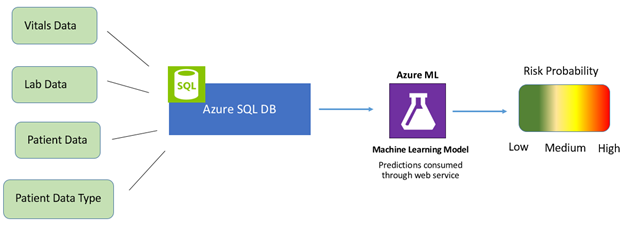Cleveland Clinic to Identify At-Risk Patients in ICU using Cortana Intelligence
This post is by Shaheen Gauher, PhD, and Fidan Boylu Uz, PhD, Data Scientists at Microsoft.
Cleveland Clinic is a non-profit academic medical center providing clinical and hospital care. It's a leader in research, education and health information and at the forefront of developing and applying new technology. Cleveland Clinic launched eHospital in April 2014 and monitors a total of 100 beds in six ICUs. Cleveland Clinic recently teamed up with Microsoft to utilize predictive and advanced analytics to identify potential at-risk patients under ICU care.

Sudden cardiac arrest is a major public health problem with more than 450,000 individuals affected annually. Vasopressors are a part of pulseless sudden cardiac arrest management protocol. These are drugs that cause the blood vessels to constrict, which, in turn, causes blood pressure to rise in an attempt to restore spontaneous circulation.
Using the data collected from monitoring units in ICUs over a period of time, we want to predict if a patient will need to be administered vasopressors in the near future, to prevent the occurrence of cardiac failure. The data included the vitals collected in ICU, the lab tests and patient information from a set of patients over a period of time. To make predictions, a binary classification model was developed, to help determine if a patient will need vasopressor therapy in the next eight-hour window. The time window was decided based on the time requirement for intervention to be effective.
This data was stored in Azure SQL Database and pulled into and aggregated in Azure ML Studio. Azure Machine Learning was used to develop the model. Boosted decision trees gave the most accurate results. The trained model was then used for making predictions and deployed as a web service. The web service can take real time patient data from the ICU as the input, and output the probability of a patient needing vasopressor therapy in the next eight hours. A timely prediction could mitigate a crisis situation and facilitate timely intervention by medical professionals.

Given the industry-wide shortage of primary care physicians and nurses, ML models like these can provide a helping hand and an extra set of eyes, especially during critical situations. Using Microsoft's big data and advanced analytics capabilities, healthcare providers can use their data to assist physicians and nurses with critical medical decisions, and improve patient care and experience.
You can see more examples of healthcare solutions in the Cortana Intelligence Gallery.
Shaheen & Fidan